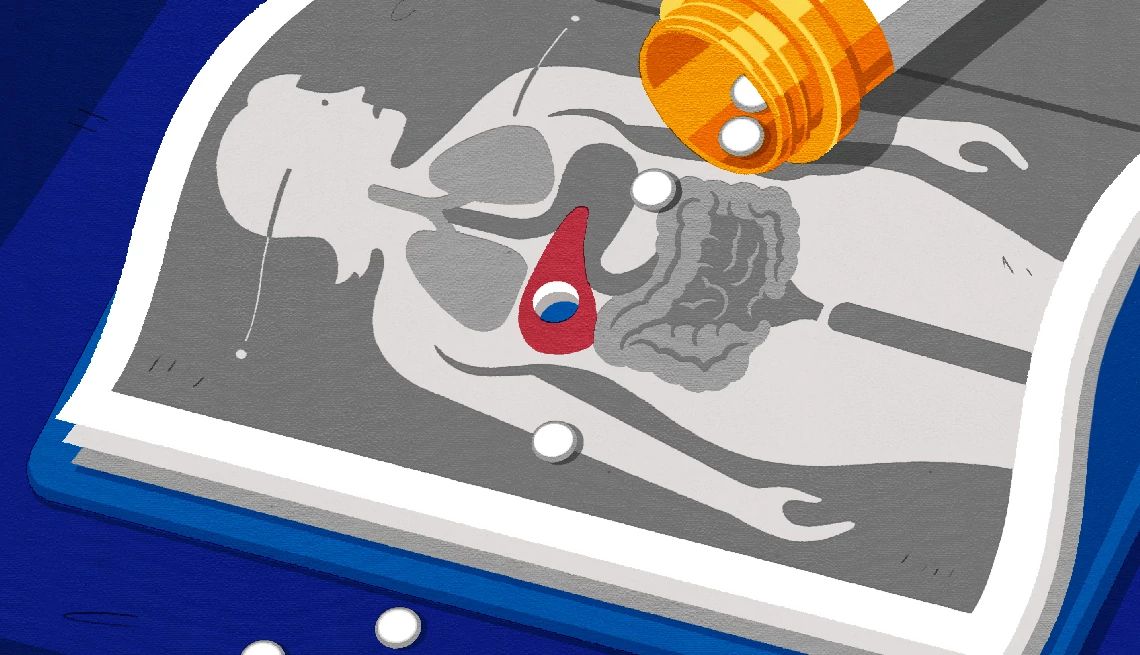AARP Hearing Center


Your liver is one of the hardest working organs in your body. It cleans your blood, helps digest food and keeps you healthy. But did you know that some common medications can make your liver sick?
It’s a condition known as drug-induced liver injury, explains Udoka Ikezuagu, M.D., a hospitalist at Loma Linda University Medical Center in Murrieta, California. And while most medications are safe when taken as directed, older adults can be more sensitive to these risks, so it’s important to be aware and bring any concerns to your healthcare provider.
Older individuals are also more likely to take multiple medications — roughly 40 percent of people 65 and older regularly take five or more prescription drugs, a Lown Institute report found — raising the risk of stress and damage to the liver.
Here are 10 medications that in some instances can hurt the liver, plus ways to help protect it from damage.
1. Acetaminophen (Tylenol)
What it is: Acetaminophen is a popular over-the-counter (OTC) medication for treating mild to moderate pain and reducing fever.
Common names: Tylenol, Paracetamol (internationally)
How it affects the liver: Acetaminophen is safe if you follow the directions and take the recommended amount, but it’s easy to overdo it, since it’s found in many combination medications, such as cold and flu remedies. Taking too much acetaminophen for a headache or muscle ache can be hard on your liver and cause harm. This risk goes up if you drink alcohol or already have a history of liver problems.
Tips to lower your risk of injury: Always follow the label and don’t take more than the recommended amount. (According to the manufacturer, the daily dose limit is 3,250 milligrams (mg) for adults. However, some doctors may allow up to 4,000 mg per day.) Be sure to read the list of ingredients on all OTC medications, and talk to your healthcare provider or pharmacist before using acetaminophen if you drink alcohol or have liver problems.
2. Statins
What they are: Statins are prescription medications that lower cholesterol levels and the risk of heart disease.
Common names: Atorvastatin (Lipitor), simvastatin (Zocor), rosuvastatin (Crestor)
How they affect the liver: While generally safe and well tolerated, statins can raise liver enzymes, in particular one called ALT, or alanine aminotransferase. However, increases less than three times the upper limit of normal may not require your doctor to stop statin use. And enzyme levels go back to normal once you stop the medication. In rare cases, they can cause serious liver problems, especially if you already have issues with your liver.
Tips to lower your risk of injury: Your healthcare provider may order blood tests to check your liver function while you take statins — not everyone requires one — and, if needed, make any necessary changes. Common blood tests to check liver function include:
- AST (aspartate aminotransferase): Normal range is 8 to 33 U/L
- ALT (alanine aminotransferase): Normal range is 4 to 36 U/L
- ALP (alkaline phosphatase): Normal range is 44 to 147 IU/L
- Bilirubin: Normal range of total bilirubin is 0.1 to 1.2 mg/dL
3. Amoxicillin-clavulanate
What it is: Amoxicillin-clavulanate, an antibiotic, treats a variety of bacterial infections.
Common names: Augmentin
How it affects the liver: Amoxicillin-clavulanate can sometimes harm the liver. Though the exact cause is unclear, research suggests it’s likely due to an allergic reaction caused by clavulanate. Liver problems can occur a few days to weeks after starting the medicine or even after finishing it. The risk increases with prolonged use and existing liver problems.
Tips to lower your risk of injury: Watch out for yellow skin or eyes (jaundice), tiredness or dark-colored urine. If you notice any of these symptoms, contact your healthcare provider immediately.


































































More From AARP
8 Types of Medication that Can Increase Your Risk of Falling
Plus, what you can do to lower your fall risk
Ways to Protect Your Liver as You Age
Liver disease is rising, but simple lifestyle strategies can help. Plus, do you need a liver detox?Smart Guide to Dry January
34 tips to help you start the New Year on sober footing